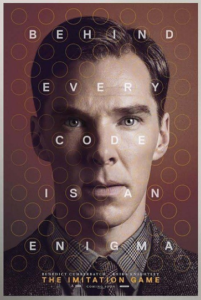
 Are you good at keeping secrets? Those of us who are can be very useful, especially during times of war. In “The Imitation Game,” we learn a few closely guarded secrets and about the particular and peculiar people who keep them. Some secrets should not be locked away forever.
Are you good at keeping secrets? Those of us who are can be very useful, especially during times of war. In “The Imitation Game,” we learn a few closely guarded secrets and about the particular and peculiar people who keep them. Some secrets should not be locked away forever.
The incredible true story chronicled in “The Imitation Game” was kept top secret for 50 years, which meant that Alan Turing’s contributions to World War II were largely unknown. “The Imitation Game” has Turing building one of the first computers that was used to translate messages intercepted from Germany. This enabled England to conduct an information war and to thwart enemy moves.
But Turing’s personal journey makes the tale even more juicy and touching, as we learn subtly that Turing was gay. And after the war, he was ultimately prosecuted under a now-defunct law against homosexuality. This part of “The Imitation Game” plays incredibly well with the central theme of the film – that of guarding secrets. Turing was one of Britain’s greatest war heroes and was posthumously recognized by the Queen.
Benedict Cumberbatch, who hit it big with BBC’s “Sherlock,” plays unsung British War hero Turing in “The Imitation Game.” And just as importantly, Alex Lawther plays Turing in his formative youth. While the narrative follows the exciting process of breaking Germany’s Enigma Code, this is a film less concerned with the wartime spy game and more interested in the character of those whose unique proclivity for keeping secrets makes them perfect codebreakers. Turing had secrets personally, not the least of which was that he was gay, but as we learn he yearns for something lost from his youth. And it is through his intellect that he hopes to regain it. But no one must know.
“The Imitation Game” is directed by Norwegian filmmaker Morten Tyldum, whose last film, “Headhunters,” received critical praise. It is interesting this handsomely made British production is brought to us from what really seems to be an outsider. Nonetheless, the direction is exactly right here as the story balances time periods spanning years during the war and the time of Turing’s youth. It isn’t a confusing narrative, because it is so well crafted – everything is expertly laid before us. The seamless integration of the time periods combined with the award-worthy performances help make the movie an undeniable winner.
While Cumberbatch will get all the accolades, including a likely Oscar nomination for a role he just seems perfect for, his character’s younger self is inhabited by actor Alex Lawther, whose performance matches and complements the lead marvelously. In fact, perhaps the film’s most moving moment comes when Lawther and not Cumberbatch is on screen. Because of the smart casting, the transition back and forth between the time periods is never distracting and certainly credible.
And all the actors melt comfortably into their roles, with the prickly Charles Dance (best known for his role on “Game of Thrones”) providing an aggressive, antagonistic foil to Cumberbatch’s measured and careful portrayal. Even Keira Knightley, who some people just abhor, is right for the role of a fellow code-breaker, who Turing shares an infatuation and deep friendship. Had one of these performances been anything less the finely tuned narrative may have slipped out of place. But like the machine in the film that Turing builds for code-breaking, when programmed correctly, perfect results can be achieved.
“The Imitation Game” proves to be a fascinating, intellectual spy thriller. Turing’s abilities as a mathematician and logistician were every match for his commitment to guarding secrets. Secrecy was critical to the War effort. And there could have been no one better suited for the job. The sadness of Turing’s later years after the war expose the danger in secrecy and how some secrets should be told.
Note: This review first appeared in print and online in the Times-Herald.
